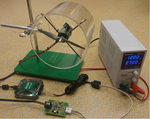Courses
AIAA Online Course
I am one of the lecturers for an American Institute of Aeronautics and Astronautics (AIAA) online course titled “Fundamentals of Aeroelasticity - From Basics to Application.” This course offers a comprehensive introduction to the field of aircraft aeroelasticity, covering both fundamental concepts and practical applications. Aeroelasticity examines the interaction between structural elasticity, structural dynamics, and both steady and unsteady aerodynamics. Throughout the course, we will explore all crucial aspects of aeroelasticity, ranging from the basics of aeroelastic modeling and phenomena to the more complex aeroelastic modeling of aircraft. We will delve into topics such as aerodynamic and structural models specifically designed for aeroelastic computations, interpolation methods for coupling aerodynamics with structures, and strategies for aeroelastic control and addressing nonlinearities. My role involves lecturing on aeroservoelasticity and the design of control algorithms.
AE1130-II Dynamics
This course is one of the most challenging first-year BSc courses. This course introduces the basic concepts of kinematics and kinetics that are necessary to understand, analyze and design a variety of mechanisms and machines, such as airplanes, automobiles or satellites. Dynamics is concerned with the description and analysis of the movement of particles and rigid bodies (kinematics) and the relations between kinematics and kinetics (mass and forces). The course covers the equations of motion and derived methods of analysis, namely the work-energy relation and the linear and angular impulse-momentum relations.
AE5051 Internship
I am one of the examiners of AE5051 Internship. The aim of the internship is to expose students to a real professional work environment different from that of TU Delft. The internship has a minimum duration of 10 consecutive weeks on a full-time basis. Full time means approx. 40 hrs p/wk and without interruption (vacation). To guarantee the real professional work experience outside the perimeter of TU Delft the internship has to take place at a company/research institute or at another university. The internship provides the opportunity to get a glance of the technical, social, economic and organizational aspects of Aerospace Engineering or related professional fields. It enables students to acquire professional skills different from those taught in the rest of the MSc program. During the internship the student will apply her/his academic skills and knowledge acquired during the MSc courses already taken so far. Therefore, earned a minimum of 30 EC before starting the internship is mandatory. The student has to aim for a project or tasks at academic master level that have well-defined outcomes and clear deliverables.
AE3200 Design Synthesis (DSE)
This is the BSc graduation project of TU Delft. To finalise their bachelor programme, third-year bachelor’s students at the Faculty of Aerospace Engineering are required to collaborate in groups of ten students in a period of ten weeks to make a design in the field of aviation, space, earth observation or related field. During the project, students go through the complete design process, from drawing up a program of demands, concept analysis and design, concept selection to the presentation of the final design. I acted as the principal instructor for Group 26, a ten-student project entitled “Air-Guard, a bio-inspired counter-drone morphing UAV”.
AERO0003 Flight Dynamics and Control
This is a MSc profile course at the University of Liège, Belgium. This course focuces on the flight dynamics and control of fixed-wing aircaft and helicopter. I was invited by Prof. Grigorios Dimitriadis and Prof. Christophe Collette to give three four-hour lectures physically at the University of Liège. My lectures cover the control design as well as stability and robustness analysis of fixed-wing and helicopter aircraft flight control.
WM0324LR Ethics and Engineering for Aerospace
This is an MSc profile course. This course describes and analyses the responsibility of engineers in the light of philosophical, historical and juridical backgrounds. Topics covered include 1) Description and analysis of the problems encountered by engineers who want to act responsibly; 2) Codes of ethics for engineers. 3) Argumentation and reasoning. 4) Uncertainty, ignorance, risks, and their implications for responsible behaviour. 5) (Philosophical) ethics, the foundation of (criteria) for good and bad, right and wrong, responsible and irresponsible behaviour; 6) Responsibility within and of organizations; 7) the role of law. Since 2021, I act as a tutor and essay supervisor for the course in every Q3.
AE4311 Non-linear and Adaptive Flight Control
This is an MSc elective course. It introduces nonlinear and adaptive control techniques to enhance the reconfigurability of aircraft flight control systems. Advanced nonlinear and adaptive control techniques such as Adaptive Nonlinear Dynamic Inversion (ANDI), Incremental Nonlinear Dynamic Inversion (INDI), Adaptive Backstepping (ABS) and Incremental Backstepping are described together with applications to fault-tolerant and reconfigurable aircraft flight control system designs. I am a guest lecturer for the INDI control theory part in every Q4 since 2020.
AE4ASM522 Applied Aircraft Aeroelasticity
This course is an MSc elective as a follow-up of AE4ASM506 Fundamentals of Aeroelasticity. This course presents three more advanced topics in aeroelasticity. 1) nonlinear aeroelasticity; 2) flexible aircraft flight dynamics; 3) panel methods. Understanding the contents of this course will prepare the student for the design of future aircraft configurations. Since 2020, I am in charge of the design, teaching, and assessment of the flexible aircraft flight dynamics and a part of nonlinear aeroelasticity in every Q4.
AE2235-II Signal Analysis and Telecommunication Principles
This is a BSc course that focuses on signal acquisition, processing and filtering. By learning this course, students will be able to apply frequency domain techniques to signal conditioning and processing, know building blocks and electronic components, apply signal modulation, produce a signal link budget, evaluate stability properties of closed and open-loop systems, and tune control systems with classical tuning methods. It also contains an experimental classroom, in which real-world derives including Light Sensor under a Rotating Disc, Accelerometer on a Cantilever Beam, Rate Gyro on a Pendulum, Pressure Sensor behind a Propeller that help students to understand Fourier transforms, aliasing, leakage, etc. Since 2017, I act an experimental classroom tutor in every Q4.








